The history of Trinidad and Tobago begins with the settlements of the islands by Indigenous First Peoples. Trinidad was visited by Christopher Columbus on his third voyage in 1498,, and claimed in the name of Spain. Trinidad was administered by Spanish hands until 1797, but it was largely settled by French colonists. Tobago changed hands between the British, French, Dutch, and Courlanders, but eventually ended up in British hands following the second Treaty of Paris (1814). In 1889, the two islands were incorporated into a single political entity. Trinidad and Tobago obtained its independence from the British Empire in 1962 and became a republic in 1976.

Eric Eustace Williams was a Trinidad and Tobago politician. He has been described as the "Father of the Nation", having led the then-British Colony of Trinidad and Tobago to majority rule on 28 October 1956, to independence on 31 August 1962, and republic status on 1 August 1976, leading an unbroken string of general elections victories with his political party, the People's National Movement, until his death in 1981. He was the first Prime Minister of Trinidad and Tobago and also a Caribbean historian, most noted for his book entitled Capitalism and Slavery.
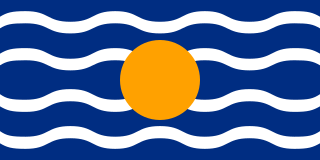
The West Indies Federation, also known as the West Indies, the Federation of the West Indies or the West Indian Federation, was a short-lived political union that existed from 3 January 1958 to 31 May 1962. Various islands in the Caribbean that were part of the British Empire, including Trinidad and Tobago, Barbados, Jamaica, and those on the Leeward and Windward Islands, came together to form the Federation, with its capital in Port of Spain, Trinidad and Tobago. The expressed intention of the Federation was to create a political unit that would become independent from Britain as a single state – possibly similar to Canada, the Federation of Australia, or the Federation of Rhodesia and Nyasaland. Before that could happen, the Federation collapsed due to internal political conflicts over how it would be governed or function viably. The formation of a West Indian Federation was encouraged by the United Kingdom, but also requested by pan-Caribbean nationalists.

Patrick Augustus Mervyn Manning was a Trinidad and Tobago politician who was the fourth prime minister of Trinidad and Tobago; his terms ran from 17 December 1991 to 9 November 1995 and from 24 December 2001 to 26 May 2010. He was also the political leader of the People's National Movement (PNM) from 1987 to 2010. A geologist by training, Manning served as Member of Parliament for the San Fernando East constituency from 1971 until 2015 when he was replaced by Randall Mitchell, but with the seat in 2020 being won by his son Brian Manning. Patrick Manning was the longest-serving member of the House of Representatives. He was the Leader of the Opposition from 1986 to 1990 and again from 1995 to 2001.
The Barbados Labour Party (BLP), colloquially known as the "Bees", is a social democratic political party in Barbados established in 1938. It has been in power in 1954–1961, 1976–1986, 1994–2008, and 2018–present. The BLP has been the governing party of Barbados since 2018.

The University of the West Indies (UWI), originally University College of the West Indies, is a public university system established to serve the higher education needs of the residents of 18 English-speaking countries and territories in the Caribbean: Anguilla, Antigua and Barbuda, The Bahamas, Barbados, Belize, Bermuda, British Virgin Islands, Cayman Islands, Dominica, Grenada, Guyana, Jamaica, Montserrat, Saint Kitts and Nevis, Saint Lucia, Saint Vincent and the Grenadines, Trinidad and Tobago, and Turks and Caicos Islands. Each country is either a member of the Commonwealth of Nations or a British Overseas Territory.

The Democratic Labour Party was the main opposition party in Trinidad and Tobago from 1957 till 1976. That party was the party which opposed the People's National Movement (PNM) at the time of Independence. After several splits brought about by leadership struggles, the party lost its hold on the Indo-Trinidadian community in the 1976 General Elections and was displaced in parliament by the United Labour Front under the leadership of Basdeo Panday, a former DLP senator. The party was the representative of the ethnic Indian community in the country; however Indian Muslims and Christians were said to be less loyal to the party than Indian Hindus.
The West Indies Democratic Labour Party (DLP) or Democrats was one of two Federal parties in the short-lived West Indies Federation, the other being the West Indies Federal Labour Party (WIFLP). The party was organised by Sir Alexander Bustamante to counter the WIFLP led by his cousin Norman Manley. In the 1958 West Indies federal elections, the party lost, winning 19 of the 45 seats in the Federal Parliament of the West Indies Federation.
The West Indies Federal Labour Party (WIFLP) or Federalists was one of two main Federal parties in the short-lived West Indies Federation, the other being the West Indies Democratic Labour Party (DLP) or Democrats. The party was the first national party of the planned West Indies Federation. In the 1958 West Indies federal elections, the party was victorious, winning 25 of the 45 seats in the Federal Parliament of the West Indies Federation.
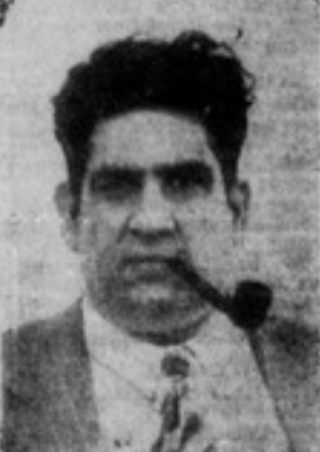
Albert Maria Gomes was a Trinidadian unionist, politician, and writer of Portuguese descent, was the first Chief Minister of Trinidad and Tobago. He was the founder of the Political Progress Groups and later led the Party of Political Progress Groups. He was active in the formation of the Democratic Labour Party (DLP) in Trinidad and Tobago and played a role in forcing Sir Alexander Bustamante out of the Federal Democratic Labour Party. Gomes briefly led DLP in 1963 when factions loyal to briefly ousted Rudranath Capildeo after Capildeo left Trinidad and Tobago to take up a position at the University of London. However, the rank and file of the party stood behind Capildeo, and Gomes left the party.
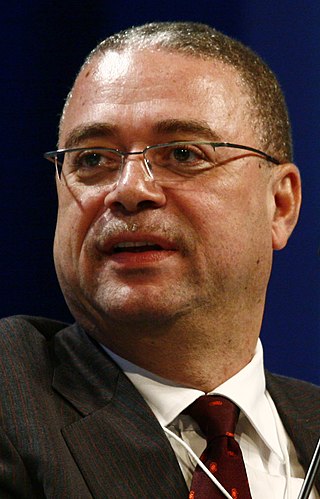
General elections were held in Barbados on 15 January 2008. A concurrent referendum to determine whether or not to become a republic was initially planned but vote was postponed.
George F. Fitzpatrick (1875–1920) was a prominent barrister of Indian descent and member of Trinidad & Tobago's Legislative Council. He played an early role in helping bring to light malpractices carried out under the system of Indian indentured labour. In 1909, George Fitzpatrick provided testimony before a British parliamentary investigation, led by Lord Sanderson, regarding alleged mistreatment of East Indian labourers living in Trinidad. The Sanderson Committee, however, failed to bring about the immediate abolition of the indentured system, only its postponement, which was further deferred by the onset of the First World War. It was not until 2 January 1920, that the system of indentured labour would come to an end. George F. Fitzpatrick's son, Hon. George Fitzpatrick, trained as a solicitor and served a three-year term as member of parliament, representing the district of San Fernando. Following the death of his first wife during childbirth, Hon. George Fitzpatrick married Phyllis Sinanan, sister of Mitra and Ashford Sinanan, uniting the Fitzpatrick family with another prominent political family of Trinidad (see Ashford Sinanan, Ambassador, Leader of the Opposition, Democratic Labour Party, West Indies Federation, founder of the West Indian National Party and High Commissioner to India. See also M. Sinanan, Constitution Commission of Trinidad and Tobago, presented to His Excellency Sir Ellis Clarke, Commander-in-Chief of Trinidad and Tobago, 22 January 1974.
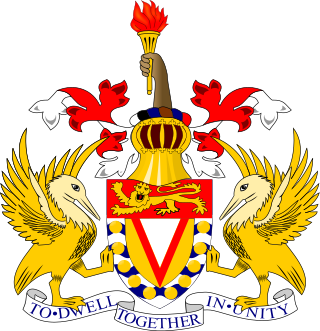
The prime minister of the West Indies Federation was the head of government of the short lived West Indies Federation, which consisted of ten provinces: Antigua, Barbados, Dominica, Grenada, Jamaica, Montserrat, St. Christopher-Nevis-Anguilla, St. Lucia, St. Vincent, and Trinidad and Tobago. The federation was formed on 3 January 1958, and was formally dissolved on 31 May 1962.

Freundel Jerome Stuart, OR, PC, SC is a Barbadian politician who served as Prime Minister of Barbados and the leader of the Democratic Labour Party (DLP) from 23 October 2010 to 21 February 2013; and from 21 February 2013 to 25 May 2018. He succeeded David Thompson, who had died in office on 23 October 2010 from pancreatic cancer.
The West Indian National Party was a political party in Trinidad and Tobago. It was originally founded on 18 November 1942 as a progressive party, aligned with the socialist views of trade unionists Quintin O'Connor and Rupert Gittens of Trade Union Congress. One of the key planks of their platform was the nationalisation of major industries. In 1945 Claude Lushington attended the Pan-African Congress in Manchester on behalf of the party.

Ivy Inez Joshua was a Grenadian-born seamstress and politician, who was the first woman elected to serve in the Legislative Council of Saint Vincent and the Grenadines when universal suffrage was granted. Though she won her seat in six consecutive election cycles, with a substantial majority each time she ran, Joshua was often the target of politically-based inquiries and investigations. She served in the legislature from 1958 to 1979 and simultaneously on the Executive Council from 1960 when she was appointed as the Minister of Social Services. Joshua served from 1961 to 1964 and again from 1967 to 1972 as a Minister without portfolio, before being appointed as Parliamentary Secretary and later leader of the opposition.

Isabel Ursula Teshea, TC was an Afro-Trinidadian social worker, human rights activist, and politician. One of the founders of the People's National Movement, she served as vice chair of the party and was the first woman to hold the office. When Trinidad and Tobago gained its independence from Britain, she ran as a candidate, becoming the first woman elected in the newly established House of Representatives. She became the first woman cabinet Minister and later ambassador for the country. Posthumously, she was awarded the Trinity Cross, the highest honor of the country.
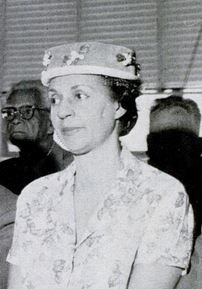
Marguerite WykeOBE was an American-born Trinidadian teacher, poet, artist and politician. After growing up in Jersey City, New Jersey, and working as a teacher, she married and moved to Canada for a decade and then relocated to Trinidad. Writing for various journals and newspapers, and cultivating the artistic community in Trinidad, she became active in local politics. Renouncing her U.S. citizenship, Wyke became a Trinidadian citizen in 1953 and became active in the island's governance. With the establishment of the West Indies Federation, she was appointed as one of two senators from Trinidad and Tobago and one of only two women senators to serve in the Federal Parliament of the West Indies Federation. When the Federation dissolved, Wyke returned to her artistic endeavors, publishing poetry and participating in various art media.

Gema Ramkeesoon was a Trinidadian and Tobagonian social worker and women's rights activist who was one of the early pioneers of the women's movement in Trinidad and Tobago. She was honored for her social service work as a member of the Order of the British Empire in 1950 and received the gold Hummingbird Medal from Trinidad and Tobago in 1976.

The history of Tobago covers a period from the earliest human settlements on the island of Tobago in the Archaic period, through its current status as a part of the Republic of Trinidad and Tobago. Originally settled by indigenous people, the island was subject to Spanish slave raids in the sixteenth and early seventeenth century and colonisation attempts by the Dutch, British, French, and Courlanders beginning in 1628, though most colonies failed due to indigenous resistance. After 1763 Tobago was converted to a plantation economy by British settlers and enslaved Africans.

















